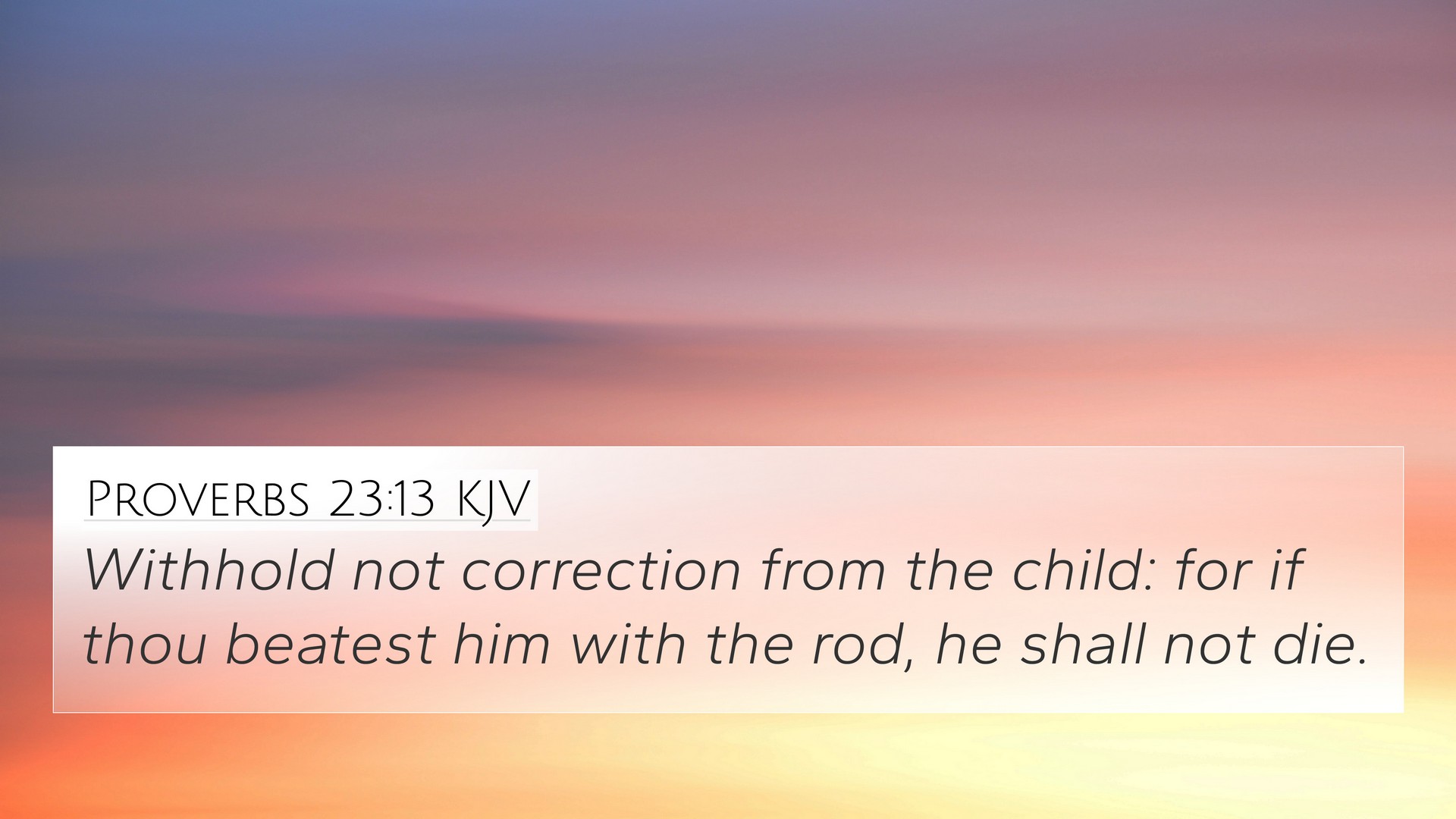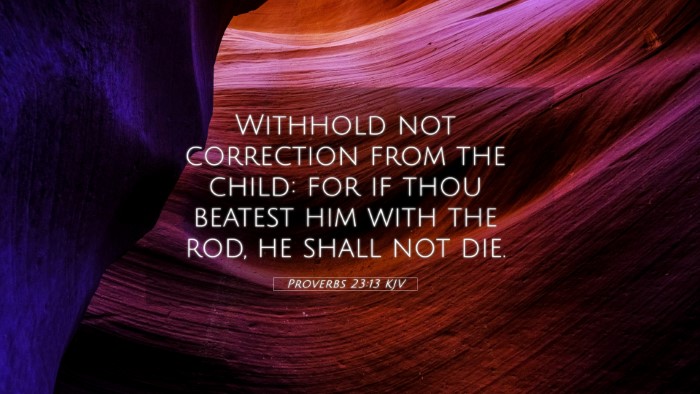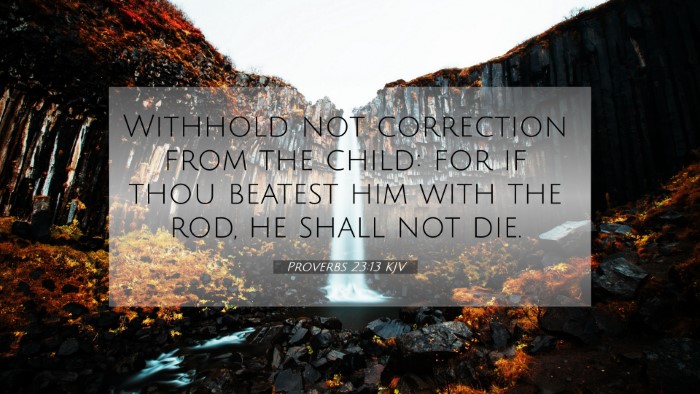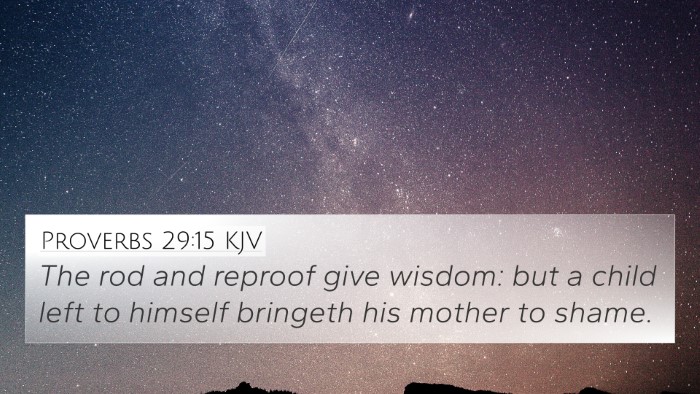Understanding Proverbs 23:13
Proverbs 23:13 states, "Do not withhold discipline from a child; if you strike him with the rod, he will not die." This verse emphasizes the importance of discipline in raising children and the idea that corrective measures are necessary for proper upbringing.
Meaning and Interpretation
This passage has been the subject of various interpretations in public domain commentaries. Below is a combined summary of insights from notable commentators:
- Matthew Henry: Henry emphasizes that discipline is essential for a child’s moral and spiritual growth. He points out that, although the act of administering discipline can seem harsh, it is fundamentally necessary to guide a child onto the right path. He suggests that failing to discipline can lead to far worse consequences for the child’s future.
- Albert Barnes: Barnes underlines the key theme that discipline serves as a form of love and responsibility. He argues that properly applied discipline, when done with love and restraint, does not harm but rather aids in the upbringing of a well-rounded individual. Barnes also notes that the “rod” symbolizes authority and correction rather than aggression.
- Adam Clarke: Clarke extends the interpretation to discuss the nature of authority and the obligation parents have toward their children. He emphasizes that discipline should be but should not be excessive or abusive. Clarke also draws connections to the idea that disciplined children are better prepared for the challenges of life.
Cross-References
This verse connects to several other scripture passages, underscoring the theme of discipline, correction, and parental responsibility. Here are some important cross-references:
- Hebrews 12:7-11: "Endure hardship as discipline; God is treating you as his children..." which emphasizes that discipline, though painful, yields righteousness.
- Ephesians 6:4: "Fathers, do not provoke your children to anger, but bring them up in the discipline and instruction of the Lord," emphasizing the balance of discipline with nurture.
- Proverbs 29:15: "The rod of reproof gives wisdom, but a child left undisciplined brings shame to his mother," affirming the need for correction.
- Proverbs 13:24: "Whoever spares the rod hates their children, but the one who loves their children is careful to discipline them," reiterating the connection between love and discipline.
- 1 Corinthians 11:32: "But when we are judged by the Lord, we are being disciplined so that we will not be finally condemned with the world," linking divine discipline with education.
- Revelation 3:19: "Those whom I love I rebuke and discipline. So be earnest and repent." This emphasizes that discipline is a demonstration of love and commitment.
- Proverbs 15:32: "Those who disregard discipline despise themselves, but the one who heeds correction gains understanding," highlighting the value of accepting correction.
Thematic Connections
Proverbs 23:13 is part of a broader conversation in biblical literature regarding discipline, love, and authority. When reflecting on the passages listed above, we can identify themes of:
- Parental Responsibility: It encapsulates the duty of parents to guide their children using appropriate means of discipline.
- Love and Correction: The underlying principle that true love includes guidance and, when necessary, correction.
- Spiritual Growth: The idea that discipline contributes to character building and preparing children for life's challenges.
- Divine Discipline: Drawing parallels to God's discipline towards His people, illustrating how correction is frequently necessary for spiritual maturity.
Practical Application
The teachings of Proverbs 23:13 should resonate with parents and educators alike. Proper understanding and application of this verse include:
- Recognizing the importance of balanced discipline that is both firm and loving.
- Utilizing discipline as a teaching tool rather than a punitive measure.
- Fostering an environment of trust, where children understand that discipline is administered out of love.
- Being reflective about one's methods of discipline and ensuring they align with biblical principles.
Conclusion
Proverbs 23:13 serves as a vital reminder of the role of discipline in upbringing. By interpreting this verse through the lens of different biblical commentaries, we gain a multidimensional understanding of its implications. Connecting this wisdom with other scriptures enhances our insight into the interconnectedness of biblical teachings regarding discipline, love, and parenting responsibility.
Further Study and Resources
For those interested in deeper studies, consider exploring:
- Bible concordance: A tool for cross-referencing themes and concepts across scriptures.
- Bible cross-reference guide: A resource that allows you to find thematic connections across various books of the Bible.
- Cross-reference Bible study methods: Effective strategies for digging deeper into scriptural connections.






